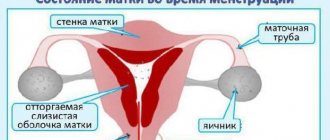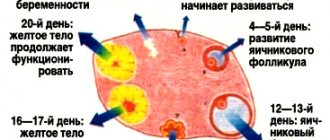Classification of vertigo
Vertigo refers to frequent dizziness that occurs due to various factors, such as brain damage, head trauma, or problems with the heart muscle.
If dizziness during menstruation occurs suddenly, you need to classify it before taking therapeutic measures. This symptom provokes a disorder of the nervous system, which happens:
- Central. Occurs as a result of insufficient blood supply to the brain. The organ cannot function normally because it senses an insufficient amount of oxygen. This type of NS disorder depends on the narrowing and dilation of blood vessels.
- Peripheral. It is not related to the monthly cycle. It occurs due to health problems, for example, when the functioning of the vestibular nerve is impaired, or the presence of an inflammatory process in the body.
Vertigo is also classified according to the nature of its occurrence. It can be systemic or non-systemic.
If hormone fluctuations regularly occur in the female body, vertigo will occur frequently. As for non-systemic dizziness, it usually bothers physically overworked and psychologically exhausted women.
Causes of dizziness associated with menstruation
Dizziness before menstruation is provoked by various reasons, including the manifestation of PMS symptoms and hormonal imbalance. Let's talk about the most common factors that provoke vertigo.
Nausea
Dizziness rarely occurs without nausea during menstruation. This unpleasant symptom is associated with the release of an egg from the ovary, which ruptures. Each time this happens, the woman may feel sick.
If dizziness bothers you regularly, and loss of performance occurs, do not put off going to the hospital.
To get rid of the feeling of lightheadedness that occurs during menstruation, you need to drink Atropine diluted with water.
Increased pressure
Jumps in blood pressure during menstruation provoke dizziness and, as a result, fainting. An increased heart rate negatively affects the functioning of the heart muscle. Hypertension (increased blood pressure) that regularly occurs during menstruation provokes confusion.
Sometimes signs such as high blood pressure, cold sweat appearing on the body and darkening in the eyes indicate osteochondrosis.
Sudden surges in pressure negatively affect the entire menstrual cycle. With a regular increase or decrease in blood pressure, fainting during menstruation is possible.
If you feel nauseous and dizzy before your period, this is not a reason to sound the alarm, because premenstrual syndrome has probably set in.
PMS is a set of signs indicating the approach of menstruation. Dizziness is one of the symptoms that appears during this time.
There are 4 forms of PMS:
- Neuropsychiatric. There is a dysfunction of the nervous system. Before menstruation, a woman’s mood often changes dramatically. In a short period of time, she may face joy, sadness, anger, regret. Sometimes depression occurs with PMS.
- Edema. Before menstruation, water metabolism in the body is disrupted. The limbs, lower back and face swell. There is a strong thirst. As fluid is retained in the body, body weight increases. Also, swelling during PMS and menstruation provokes a malfunction of the gastrointestinal tract.
- Cephalgic. This form of PMS is characterized by discomfort in the heart area, increased heart rate and dizziness. Before menstruation, you often experience a headache, nausea, and increased sensitivity to unpleasant tastes and smells.
- Krizovaya. Characteristic of women over 40 years of age. There may be causeless anxiety and panic.
You can read more about the concept of PMS in a separate article on our website.
Low hemoglobin – anemia
When the level of hemoglobin in the blood decreases, weakness and headache occur. Anemia often occurs with heavy bleeding during menstruation. It is provoked by prolonged menstrual flow.
First aid for vertigo
It will not be possible to completely eliminate the symptoms of PMS, but it is possible to reduce their intensity and improve the condition of the female body.
If you are worried about a headache, a feeling of nausea, or slight dizziness during menstruation, you need to unbutton your collar, check the room, sit or lie down, inhale as much air as possible to provide the brain with oxygen, and neutralize unpleasant symptoms.
8 drops of 0.1% atropine can help get rid of PMS symptoms. “No-spa” will eliminate spasms, sedatives and tranquilizers (the effective “Andaksin”, the drug “Persen”) will relieve nervous tension.
We eliminate the cause and thereby get rid of dizziness
If you experience fainting during your period, you should consult a doctor. In this case, self-medication poses a serious danger not only to health, but also to life.
Folk remedies
When you feel dizzy during menstruation, you can use the advice of traditional medicine. You will need medicinal plants and essential oils.
A list of the best folk remedies for dizziness is given in the table.
How to get rid of dizziness?
Since PMS does not have a specific cause, treatment consists primarily of prevention and elimination of specific symptoms. There are several therapeutic options.
Tablets to relieve discomfort
If during menstruation or before menstruation you feel dizzy, nauseous, or have other symptoms, your doctor may prescribe hormonal contraception.
How do hormonal drugs work:
- block the production of natural hormones in the ovaries, and, accordingly, ovulation;
- stabilize hormonal levels throughout the entire cycle;
- affect the height of the endometrium, therefore, the amount of bleeding.
Traditional methods of treatment
To alleviate the condition when you feel sick and dizzy during menstruation, before or after the cycle, cuff - a “female” herb - will help. It calms the nerves, relieves pain, and regulates excessive bleeding.
Pour in 2 tsp. plants 250 ml boiling water, leave for 10 minutes.
"Female" herbs for dizziness also include:
- St. John's wort;
- Vitex vulgare;
- black cohosh;
- soybean and clover extracts.
If you feel dizzy during menstruation, or have painful chest tension, aspen seed oil will help. Its beneficial properties are provided by gamma-linolenic acid, which is converted in the body into prostaglandins, hormone-like substances. The oil can be taken in tablet form or in its pure form (added to food).
Supporting the body without drugs
When you have a headache, nausea, or other unpleasant symptoms during your period, movement, foods rich in fiber, raw fruits and vegetables will help:
- Aromatherapy. A bath with a few drops of chamomile, wormwood, juniper, and marjoram oil will have a good effect.
- Phytotherapy. Traditional medicine recommends drinking tea from chamomile, valerian, and raspberry. When you feel sick during your period, try ginger tea.
- Relaxation techniques. Yoga and meditation will help relieve stress and alleviate unpleasant symptoms.
Why does dizziness occur before menstruation and how to deal with it?
Premenstrual syndrome (PMS) occurs differently for each woman; in more than 85% it is pathological, that is, it is accompanied by clinical symptoms. Dizziness and nausea are most often recorded before menstruation - in more than 70%. Many also experience spastic or constant abdominal pain, migraine-like headaches, accompanied by photophobia and vomiting. There may be stool disorders, dysuric phenomena, and so on.
The cephalgic type of PMS is manifested by dizziness and headaches
Manifestations of the syndrome
Besides the dizziness associated with PMS (which can also make you feel nauseous), the most common symptoms of the syndrome include:
- irritability, mood swings;
- anxiety, crying, depression;
- impaired concentration;
- headache;
- fainting conditions;
- increased sensitivity and tension in the chest;
- stomach ache;
- feelings of abdominal fullness, flatulence, changes in appetite;
- libido disturbance;
- sleep disorders;
- swelling.
Important! Sometimes in the first days of the cycle there may even be loss of coordination and unsteadiness of gait. This is due to a sharp drop in blood pressure, especially with heavy blood loss.
However, according to experts, during menstruation, dizziness and the above symptoms are minor manifestations of PMS. There are up to 300 symptoms of various types. Their large number is partly due to the lack of precise diagnostic criteria that would help distinguish the syndrome from both normal conditions and pathological conditions such as depression or anxiety disorders.
Development mechanism and main reasons
Changes in hormonal levels that precede menstruation affect autonomic functions. The nervous and cardiovascular systems are the first to feel an imbalance of hormones.
Depending on the predominance of the underlying mechanism, dizziness before menstruation can be divided into two types:
- Peripheral - are a consequence of the influence of hormonal disorders on the vestibular apparatus and cerebellum, which are responsible for the coordination of movements. Such disorders are most often accompanied by nausea.
- Central - caused by electrolyte disturbances due to water and salt retention, which leads to swelling of the brain tissue, resulting in oxygen starvation of the nervous tissue.
Women who have not given birth suffer more from premenstrual syndrome.
Hormones in girls during puberty are always in some chaos, which is why in childhood the first menstruation of an unsuccessful cycle can lead to significant discomfort before, during, and after menarche.
Causes and first aid
Dizziness and nausea during menstruation can have various causes. In some cases, these phenomena are observed before the onset of menstruation, and are associated with manifestations of premenstrual syndrome, in others, dizziness occurs directly during bleeding, and sometimes discomfort appears after menstruation. Let's consider each case separately.
Find out more about the causes of dizziness in women of different ages and how to provide first aid here.
Before menstruation
Before menstruation, hormonal levels begin to change in the female body. All systems, including blood vessels and the nervous system, certainly respond to these changes.
In most cases, dizziness before menstruation is a vegetative reaction of the body, and the reasons may be the following:
- pressure changes;
- premenstrual syndrome;
- lability of the nervous system;
- hormone imbalance.
We suggest watching a video about the causes of dizziness before menstruation:
Can you feel sick?
An additional symptom may be nausea . In most cases, this is a manifestation of premenstrual syndrome, which affects:
- psycho-emotional;
- vegetative-vascular;
- metabolic-endocrine function.
With PMS, a woman may feel:
- anxiety;
- oppression;
- nausea and vomiting;
- muscle pain;
- weight gain and so on.
Nausea before menstruation may also indicate pregnancy; in this case, after about a week the following will appear:
- dizziness during pregnancy;
- scanty bleeding;
- swelling of the mammary glands and so on.
Vomiting before menstruation can also be due to gynecological disorders:
- Abnormal position of the uterus - if it is displaced back, it puts pressure on the nerve endings, which causes pain and nausea.
- Dysmenorrhea – painful periods. In this case, a woman may experience severe stomach pain, dizziness, fever, and nausea.
Nausea and dizziness before menstruation can be associated with taking oral contraceptives, diseases of the endocrine system, problems with the gastrointestinal tract, stress, physical strain and many other factors.
Only a doctor can determine the exact cause.
Severe malaise
This may be due to PMS. Symptoms of illness are usually cyclical and the same :
- loss of consciousness;
- temperature rise to subfebrile levels;
- nausea and vomiting;
- headaches and migraines, signs of chronic fatigue;
- tearfulness and emotional lability;
- stool instability;
- increase or decrease in blood pressure.
Weakness
Weakness before menstruation usually appears in the legs. A woman should understand that if weakness before menstruation is accompanied not only by dizziness, but also by pale skin, shortness of breath, arrhythmia, and pressure changes, then this is most likely the result of low hemoglobin.
It is necessary to determine the cause of this condition, and if these are manifestations of the same PMS, the discomfort passes quickly enough, but if such symptoms continue to be observed regardless of the cycle, the help of a doctor is required.
How to deal with the problem?
If the gynecologist and neurologist have not found any pathologies, the following are recommended to relieve unpleasant symptoms before menstruation:
- a week before menstruation, reduce physical activity;
- change your diet, reduce the amount of sweets, eliminate fatty and salty foods, drink more clean water - this can prevent the occurrence of nausea;
- take decoctions of the following medicinal herbs: clover, lemon balm, mint, hawthorn, valerian, parsley seeds;
- If the signs are very pronounced, you should consult a doctor.
During critical days
During menstrual bleeding, your head may feel dizzy for the following reasons::
- continued influence of PMS;
- taking certain medications;
- decreased blood pressure;
- stress;
- lack of glucose levels in the blood.
Sometimes the cause of dizziness during menstruation can be diet or insufficient intake of carbohydrates and vitamins. In this case, it is a banal lack of nutrients in the body, that is, loss of strength.
On the first day
On the first day, dizziness can be caused by a continuing imbalance of sex hormones, which has a negative effect on vascular tone. In addition, prolactin levels increase, which leads to fluid retention in the body and increased blood pressure.
If menstruation is very heavy, dizziness in women may occur as a result of anemia. Quite often, the onset of menstruation provokes migraine attacks, which can make you feel dizzy.
Weakness
Weakness during menstruation is, in principle, normal . The woman loses blood, therefore, the hemoglobin level decreases. In addition, when fluid accumulates in the tissues, intracranial pressure increases, VSD worsens, and drops in blood pressure occur.
Other causes of weakness and dizziness during menstruation:
- depression;
- avitaminosis;
- sedentary lifestyle;
- insufficient exposure to fresh air – hypoxia.
Nausea and gag reflexes
Nausea and dizziness during menstruation have the same causes:
- hormonal imbalance;
- accumulation of fluid in tissues;
- significant blood loss;
- psychological reasons.
How to cope with dizziness during this period?
If your head is very dizzy, it is better to take a sick leave for a couple of days and rest more. During an attack, it is better to open the window and breathe deeply to saturate the cells with oxygen.
If dizziness occurs regularly during menstruation, a week before their onset you should take vitamins, drink pomegranate juice, tea with ginger, give up alcohol, walk more in the fresh air, and give up salty and smoked foods.
Symptoms
Most often, the symptoms of PMS in women are the same and cyclical, that is, they occur immediately a day or two before the start of the monthly cycle. A peculiar aura allows you to prepare for the onset of bleeding. If the symptoms are severe, you should consult a gynecologist to alleviate the condition.
If the attacks are irregular, then a trip to the doctor should be mandatory. The absence of cyclical dizziness before menstruation occurs due to nervous and physical fatigue, astheno-neurotic syndrome after a somatic or infectious disease. It requires a diagnostic search and medicinal support.
An aura before the menstrual cycle may have the following symptoms:
- Dizziness, which is sometimes accompanied by loss of consciousness.
- Low-grade fever - an increase in body temperature to 37.0-37.5 ˚С.
- It may feel nauseous and sometimes vomit.
- Headaches of the megrenous type (half of the head, worsened by loud sounds, bright light).
- Mild malaise, weakness, drowsiness and lethargy are all signs of chronic fatigue.
- Emotional lability and increased tearfulness.
- Decrease or increase in pressure.
- Stool instability and so on.
What is normal health during menstruation?
The following symptoms are normal for menstruation:
- bleeding within acceptable limits, not exceeding 7 days;
- a slight feeling of discomfort in the first days of menstruation;
- decreased sex drive;
- soreness, enlargement (engorgement) of the mammary glands;
- minor pain in the lower abdomen;
- moderate decrease in performance and concentration;
- increased thirst.
The listed symptoms are quite acceptable and mean that the menstrual cycle is proceeding normally. But this doesn't always happen. If during menstruation a depressive syndrome is expressed, and a woman cannot control her psycho-emotional state, expressed by inappropriate behavior, aggressiveness and irritability, then this clearly indicates pathology.
A similar condition, supplemented by cramps and severe pain in the lower abdomen, nausea, vomiting and migraines, dizziness, and increased body temperature, is a real reason to seek medical help.
Diagnostics
An indication of the cyclical nature of pathological symptoms helps establish a diagnosis.
It is believed that premenstrual syndrome is the norm, so women rarely consult a doctor. Only under conditions of severe impairment and significant discomfort during menstruation. This is not an entirely correct approach, since even minor changes in the condition can lead to significant disorders, and symptoms are the first signs.
The problem of painful menstruation, which brings significant discomfort, is dealt with by a doctor at the antenatal clinic. The following diagnostic measures are suggested:
- Blood test for female hormones at various stages of the cycle.
- Ultrasound examination of the uterus and appendages.
- In some cases, colposcopy may be necessary, diagnostic curettage and other research methods are performed.
During the diagnostic process, hormonal disorders are identified, which can be symptoms of various diseases: polycystic ovary syndrome, fibromatous changes in the uterus and others.
Often such diseases are the cause of possible infertility. Increased signs of PM can also occur during pathological pregnancy: tubal fertilization, impaired attachment and implantation of the fertilized egg, and so on. Requires urgent attention to a gynecologist.
Treatment
Treatment tactics for PMS are aimed at relieving its symptoms, in particular dizziness.
Dizziness that occurs before menstruation causes significant discomfort: it affects the ability to work, is a contraindication for driving, and so on, so correction of such conditions is necessary.
After excluding serious pathologies, if the cause of dizziness is vegetative disorders, then treatment is prescribed. They mainly use drugs that normalize hormonal levels - oral contraceptives are used, their selection is carried out exclusively by a gynecologist.
Prevention
Normalizing your lifestyle significantly reduces the risk of developing premenstrual syndrome. After the middle of the menstrual cycle, you need to prepare for your period:
- limit the amount of salt;
- limit the amount of fluid (preventing edema);
- exclude coffee, alcoholic and tonic drinks;
- take a walk in the fresh air;
- avoid stressful situations, physical strain;
- adequate physical activity in the gym, on the dance floor, and so on;
- fortified diet (increase the amount of fresh vegetables and fruits in the diet).
Healthy eating is one way to relieve the symptoms of premenstrual syndrome.
It is recommended to conduct vitamin prophylaxis courses every two years, enriching the body with vitamins B, C, E, A and others. The diet should be rich in microelements and minerals, especially iron, to prevent iron deficiency anemia in the postmenstrual period.
General recommendations
To avoid unpleasant symptoms in the premenstrual period, as well as during menstruation, you should ensure a protective regime: no heavy physical activity or stress. It is necessary to avoid general hypothermia and moderate adherence to bad habits. Eat foods rich in vitamins and minerals necessary for the normal functioning of the body. Taking medications to relieve unpleasant symptoms will allow you to endure this period more comfortably.
Any functional change observed repeatedly requires consultation with a therapist and gynecologist. Taking the medicine should be discussed with your doctor in advance. Taking good care of your health will help you avoid discomfort during menstruation.
Read
Also:
- Period calculator
- During menstruation, it hurts to go to the toilet, both big and small, reasons
- Why do I have white discharge instead of my period?
- Why do you not have periods regularly and what to do? Unstable menstrual cycle
- Why does the lower abdomen hurt and pull after menstruation?
- Headaches during menstruation: what to do and how to treat them
Menstruation: dizziness and its causes
Dizziness during menstruation occurs in almost 70% of women. And the reasons most often do not have a direct connection with the process itself. In addition to the fact that blood pressure drops and migraines can contribute to this, it can also be simple drug abuse. And even stress.
Interesting! It has been proven that
dizziness ( vertigo ) before, during or after menstruation is caused not only by vasodilation, but also by the release of large amounts of female hormones into the blood.
Most often, in the first phase of menstruation, women experience:
- severe headaches;
- fatigue and feeling of heaviness;
- swelling of the limbs;
- weakness;
- nausea and vomiting.
Often, a few days before their period, women can gain a couple of kilograms of excess weight, but everything is purely individual and can be a fairly quickly passing phenomenon. If you feel dizzy during menstruation infrequently or go away quickly, then there is no reason to panic, and you just need to wait it out.
But if nausea and dizziness during menstruation are constant and cause serious inconvenience, then you should not postpone going to the doctor.
The menstrual cycle is a normal phenomenon for the female body, but it is in its active phase that the balance of progesterone, estrogen and other biological substances is disrupted:
- an increase in estrogen means a decrease in blood sugar and, as a result, swelling, weight gain, headaches, dizziness;
- lack of progesterone also provokes swelling, weight gain, headaches and vertigo;
- increased costs of hemoglobin to replace lost blood forms its deficiency, which means a lack of oxygen, which leads to dizziness, nausea, and weakness.
Women are most concerned about dizziness:
- overweight;
- with sudden mood swings;
- with a tendency to stress;
- smokers;
- living in megacities.
Interesting! Often, after giving birth or turning 30, a woman notices that all the negative signs of her period have passed, and scientists associate this with the normalization of hormone levels.
Causes of dizziness during the menstrual period
Before menstruation, many women notice changes in their mental and physical state. Some complain that their backs begin to ache, their legs become heavy with cast iron, and their heads hurt. Many people note that they become irritable, whiny, and find it very difficult to control themselves. And another sign of approaching menstruation is the appearance of dizziness.
The image “moves” when you turn your head, the floor “goes away from under your feet” at the most unexpected moment, as soon as you get up from the chair, your whole body moves to the side. If dizziness occurs during menstruation, the reasons may be different, but most often experts justify the discomfort with the release of hormones.
Hormonal imbalance
The first day of menstruation is the day when bleeding begins. But for many women it begins with spotting, light mucous brownish discharge. Literally the day before the start of menstruation, the concentration of progesterone and estrogen decreases. These are the main female hormones. As soon as their level drops, the concentration of prostaglandins, substances that provoke uterine contractions and also stimulate pain, begins to increase.
Typically, dizziness caused by prostaglandins is accompanied by a severe headache. In addition, the woman feels nausea, severe weakness, lethargy, and her performance decreases.
Experts note that with hormonal imbalance in women, sugar production is disrupted. Lack of glucose causes general weakening of the body. Because of this, you feel dizzy during your period and a few days before bleeding begins.
Accumulation of fluid in tissues
Before menstruation, water-salt metabolism is disrupted. Sodium and water are retained by the kidneys, which leads to swelling of the legs, face, and internal organs. Many women note that their fingers seem to swell before menstruation, and their labia increase in volume.
During the premenstrual period, a woman may suffer from dizziness caused by swelling of the brain tissue. Due to the fact that vascular permeability decreases, spasms occur, and cerebral circulation is disrupted. Since edema worsens the outflow of cerebrospinal fluid, excess fluid in the skull begins to put pressure on brain tissue.
The main negative impact is on the posterior cranial fossa. It is in it that the receptors are located, the pressure on which provokes the appearance of dizziness and nausea. This is why you feel nauseous and dizzy before your period. After urination it becomes easier for a while.
Sometimes women even notice dramatic relief. As soon as the first drops of blood appear on the pad, the pain and dizziness stop, and nausea disappears. But my stomach and back begin to hurt.
Significant blood loss
Nature designed it in such a way that menstrual periods do not cause much damage to a woman’s hematopoietic system. On the contrary, having lost a small part of the blood, the girl’s body seems to be undergoing renewal. Experts have calculated that in five days of menstruation a woman loses 200-250 ml of blood (about a glass). All other secretions are mucus and epithelial particles.
But sometimes a woman experiences heavy bleeding. They can be triggered by hormonal imbalance, decreased immunity, inflammatory and infectious diseases. If a woman loses a lot of blood, she develops anemia and becomes dizzy after her period.
Dizziness may not be systemic, for example, a woman suffered high physical or emotional stress during the period of bleeding, which led to significant blood loss and impaired sugar production.
Feeling very dizzy? It is best to see a doctor and take a sick leave for a couple of days so as not to put yourself in danger of falling somewhere on the way to work. At home, women have access to some methods to help alleviate the condition:
- If you feel dizzy or have a severe headache, you should lie down. It is advisable to sleep for a couple of hours during the day in complete silence in a dark room.
- If dizziness occurs when changing body position, you need to get up slowly, without shaking your head, and avoid sudden turns and jerky movements.
- Breathing exercises will help relieve an attack of severe dizziness. To perform, you need to sit on a chair, turn your shoulders, straighten your back. Count to yourself “one-two-three” and slowly inhale, then exhale to the count of “four, five, six.” The exercise is repeated 5-6 times until the condition normalizes.
If you feel dizzy during your period, but you need to travel by bus and feel ill in transport, focus on a stationary object, for example, the back of a chair, a non-shiny handrail, perform breathing exercises, trying to mentally relax as much as possible.
Attention! Do not close your eyes; loss of “support” in the form of a visual object can lead to loss of stability and fall.
Tablets to relieve discomfort
If a woman constantly feels unwell during her period, she can consult a doctor and, together with him, select medications that relieve dizziness and headaches. During menstruation, girls take the following medications:
- No-shpa, Spazmalgon, Drotaverine, Aspazmik - to relieve muscle spasms and eliminate severe headaches.
- Persen, Afobazol, Grandaxin - to eliminate nervous and emotional stress.
- Ferroplex, Sorbifer - to normalize hematopoiesis, eliminate anemia caused by heavy periods.
Regardless of why you feel dizzy during menstruation, it is not advisable to “prescribe” yourself to take medications, for example, drinking Cerucal. After all, the cause of discomfort can be any disease, which only a doctor can diagnose.
You should not “regulate” your hormonal balance by taking special medications. To determine whether the occurrence of unpleasant sensations depends on the level of hormones, it is necessary to take a blood test.
Traditional methods of treatment
To reduce the discomfort caused by dizziness, you can:
- Drink soothing infusions, teas with chamomile, mint, lemon balm.
- Drink green tea with honey. This is an excellent diuretic that helps get rid of swelling.
- Perform self-massage of the neck, head, and ears. This will help relieve the feeling of lightheadedness and restore concentration.
When dizzy during menstruation, sometimes a woman is recommended to drink 30-50 grams of red wine or eat a couple of bars of dark chocolate to restore hemoglobin levels in the blood.
Classification
Feeling dizzy before your period? It may be a disorder of the nervous or vascular system, which is classified as:
- central, associated with a lack of oxygen for brain function. Directly depends on the dilation and constriction of blood vessels, which is not uncommon for PMS syndrome;
- peripheral, which usually has no connection with the cycle, and its cause is the effect of other health problems on the functioning of the inner ear or vestibular nerve.
Dizziness and nausea both before and after menstruation can be caused by:
- Systemic in nature, which is the most dangerous, because such symptoms occur from month to month and may even have an aura. Reasons: disturbances in the functioning of the vestibular apparatus or hormonal imbalance, which means you urgently need to consult a doctor.
- Unsystematic in nature, when you feel dizzy during menstruation due to intense physical activity or a strict diet, which lead to a sharp release of hormones and glucose starvation.
When to seek help from a doctor
If menstruation is constantly accompanied by unpleasant sensations, you should immediately consult a specialist. It is recommended to undergo an examination by a gynecologist if:
- discomfort intensifies not only during the “bloody” discharge, but also after it has passed;
- headaches of various types are observed, the woman constantly feels sick, throughout the day, severe vomiting occurs;
- symptoms are observed indicating the presence of an inflammatory process - hyperhidrosis, hyperthermia, chills, aches;
- signs indicate the presence of infection - the discharge has a specific odor, burning and itching, pain during urination;
- the pain persists and does not go away after taking analgesics and antispasmodics.
Only a thorough diagnosis will help determine the cause of what is happening: why you feel dizzy during and after menstruation, the origin of vomiting, nausea and other symptoms.
Emergency help
Why do you feel dizzy and nauseous before your period? We figured it out, but what to do about it? Unfortunately, it is impossible to completely eliminate PMS symptoms. However, it can be significantly reduced. If you feel dizzy these days, you need to:
- lie down or sit comfortably;
- go out into fresh air or ensure its flow into the room;
- unbutton the tight collar;
- make several deep entries so that a sufficient amount of oxygen enters the brain;
- when you feel very dizzy or feel sick during menstruation, you need to take 10 drops of a weak solution of atropine;
- painful spasms will be removed by taking a no-shpa tablet;
- increased nervousness is relieved by taking tranquilizers or sedatives;
- maintain a drinking regime so as not to disturb the water balance in the body.
First aid
Mid-cycle dizziness and nausea can be relieved with simple steps. A woman who is unwell should:
- ventilate the room immediately;
- unfasten the belt and collar if they interfere with proper breathing;
- lie down or sit on a chair in a comfortable position;
- try to take deep breaths.
Simple, quick help will restore oxygen supply to the brain and significantly reduce symptoms of illness.
Drug treatment
Doctors do not recommend self-medication. If a patient regularly feels dizzy before menstruation, it is better to seek help from a gynecologist and undergo a thorough examination to determine the cause of the pathological condition. Drug therapy depends on the factors influencing the manifestation of the symptom.
Basically, the doctor prescribes the following drugs:
- Hormonal agents. The tablets help normalize hormone levels throughout the month.
- Antihistamines.
- Blocker type anti-nausea medications. For example, Dramamine and Cerucal.
- Painkillers. No-Shpa is popular. They help when your stomach or head hurts.
- Vitamin and mineral complexes. Magne B6 and Vitrum have a beneficial effect on women's health. Their action is to normalize the endocrine and reproductive characteristics of the body.
Traditional therapy
When there is weakness during menstruation and a slight dizziness, it is allowed to eliminate the symptoms with the help of traditional therapy. The main thing is to carefully select components to avoid allergic reactions.
If you feel dizzy, nauseous, or feel nervous, these recipes help a lot:
Clover
Take 40 g of clover flowers. Add 0.5 liters of alcohol or vodka. Wait 2 weeks, leaving the product to infuse in a dark room or closet. Take 30–40 drops of medicine a quarter of an hour before meals.
Mint
Pour boiling water over 40 g of dried mint. Infuse the product for 1 hour. A single dose is 75 milliliters of the drug. You are allowed to take the medicine three times a day. Melissa, St. John's wort and plantain are also suitable for infusion. If the product is bitter, you can sweeten it with honey.
Preventive actions
It happens that after menstruation you feel nauseous and/or dizzy, and not just in the active phase. Most often, this can be solved quite simply, but requires serious effort on your part. And any prevention must begin with a change in diet, because it is through it that our body receives all the beneficial substances.
Negative symptoms will go away faster if, for at least a week, your diet is enriched with apples, liver and buckwheat dishes, dark chocolate and complex carbohydrates.
Interesting! These days, metabolism is greatly accelerated ,
and the body spends more calories than usual, so you can slightly increase the caloric content of your diet, but without fanaticism.
Those who experience nausea and dizziness during menstruation should follow these rules:
- Reduce both physical and mental stress.
- Remove yourself from stressful situations and try to avoid them.
- Spend most of your time outdoors or in well-ventilated areas.
- Completely avoid alcohol and strong coffee.
- Reduce the amount of salt, salted and smoked products to a minimum.
Special gymnastics, during which endorphins are actively produced, can help get rid of vertigo. They will lift your mood and increase your pain threshold, which will reduce your pain.
This is why athletes and women with an active lifestyle rarely experience negative symptoms of PMS.









